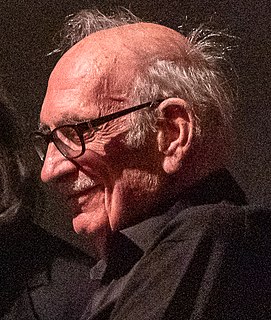Related Research Articles

The Pulitzer Prize for Music is one of seven Pulitzer Prizes awarded annually in Letters, Drama, and Music. It was first given in 1943. Joseph Pulitzer arranged for a music scholarship to be awarded each year, and this was eventually converted into a prize: "For a distinguished musical composition of significant dimension by an American that has had its first performance in the United States during the year."

George Henry Crumb or George Henry Crumb Jr. was an American composer of modern classical and avant-garde music. He was known as an explorer of unusual timbres, alternative forms of notation, and extended instrumental and vocal techniques, which obtain vivid sonorities. Examples include seagull effect for the cello, metallic vibrato for the piano, and using a mallet to play the strings of a double bass, among numerous others. Crumb's most renowned works include Ancient Voices of Children (1970), Black Angels (1971), and Makrokosmos III (1974).

The Kronos Quartet is an American string quartet based in San Francisco. They have been in existence with a rotating membership of musicians for almost fifty years. The quartet covers a very broad range of musical genres, including contemporary classical music. More than 900 works have been written for them.

Gunther Alexander Schuller was an American composer, conductor, horn player, author, historian educator, publisher, and jazz musician.
Osvaldo Noé Golijov is an Argentine composer of classical music and music professor, known for his vocal and orchestral work.
Steven ("Steve") Mackey is an American composer, guitarist, and music educator.
Richard Wernick is an American composer. He is best known for his chamber and vocal works. His composition Visions of Terror and Wonder won the 1977 Pulitzer Prize for Music.
Joseph Clyde Schwantner is a Pulitzer Prize-winning American composer, educator and a member of the American Academy of Arts and Letters since 2002. He was awarded the 1970 Charles Ives Prize.
The Theodore Presser Company is an American music publishing and distribution company located in Malvern, Pennsylvania, formerly King of Prussia, Pennsylvania, and originally based in Bryn Mawr, Pennsylvania. It is the oldest continuing music publisher in the United States. It has been owned by Carl Fischer Music since 2004.

David Krakauer is an American clarinetist who performs klezmer, jazz, classical music, and avant-garde improvisation.
Neva Pilgrim is an American soprano known for her work in the performance of contemporary classical music.

Stephen Jaffe is an American composer of contemporary classical music. He lives in Durham, North Carolina, United States, and serves on the music faculty of Duke University, where he holds the post of Mary and James H. Semans Professor of Music Composition; his colleagues there include composers Scott Lindroth, John Supko, and Anthony Kelley. Jaffe graduated summa cum laude from the University of Pennsylvania in 1977; he received a master's degree the following year from the same institution. During his time in Pennsylvania, he studied with George Crumb, George Rochberg, and Richard Wernick.
Octavio Brunetti was a pianist, arranger and composer from Argentina. He was best known for his participation in the album Te amo tango by Raul Jaurena, which won the Latin Grammy Award for Best Tango Album in 2007, and was one of the most sought after tango pianists.
The St. Lawrence String Quartet is a Canadian string quartet, and one of Canada's premier chamber ensembles.
David T. Little is an American composer and drummer known for his orchestral and operatic works, most notably his opera Dog Days which was named a standout opera of recent decades by The New York Times. He is the artistic director of Newspeak, an eight-piece amplified ensemble that explores the boundaries between rock and classical music, and is a member of the composition faculty at Mannes School of Music.
All Set, for jazz ensemble, is a 1957 composition for small jazz band by the American composer Milton Babbitt.
La Pasión según San Marcos is a contemporary classical composition by Argentinian composer Osvaldo Golijov. It was finished in 2000 and is amongst Golijov's most well known compositions. It is famous for combining several Latin and African musical styles.
The Symphony is a symphony for orchestra by the Israeli-American composer Shulamit Ran. The work was commissioned by the Philadelphia Orchestra under the direction of Riccardo Muti in 1987 and was given its world premiere on October 19, 1990. The piece was awarded the 1991 Pulitzer Prize for Music and took the first place Kennedy Center Friedheim Award that same year. It was composed in a primarily atonal style.
Thomas Ludwig is an American composer of classical music and a symphony conductor. His works have been performed and recorded with orchestras such as the London Symphony Orchestra, Indianapolis Symphony Orchestra, and the New York City Symphony, and have won prizes at the Kennedy Center Friedheim Awards in Washington, D.C. and the Indiana State University Contemporary Music Festival.
The Stoeger Prize from the Chamber Music Society of Lincoln Center is an international music prize for composers of chamber music. The US$25,000 cash award is given every two years in recognition of significant contributions to the chamber music repertory. The money was donated by Milan Stoeger, a psychoanalyst and a long-time subscriber to the Chamber Music Society, in honor of his wife. The Elise L. Stoeger Prize was established in 1987.
References
- ↑ "Four Composers Vie For Friedheim Awards". August 20, 1989 – via NYTimes.com.
- ↑ Saxon, Wolfgang (September 6, 2002). "Eric Friedheim, 92, Publisher and Arts Patron" – via NYTimes.com.